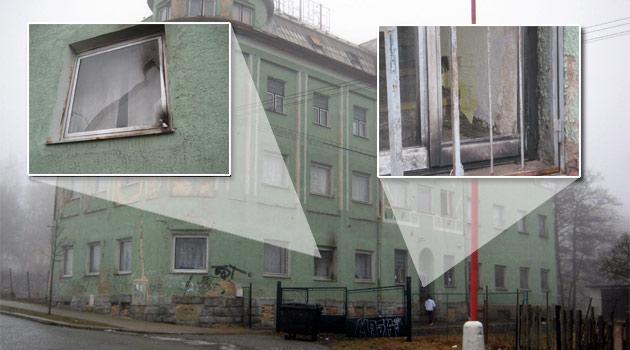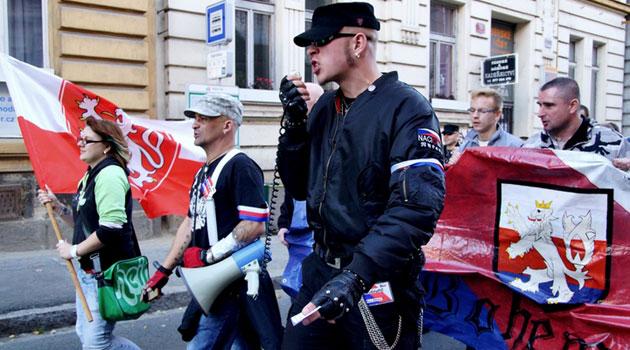Czech cell of international Blood & Honour organization indicted

This autumn a nine-member group from various parts of the Czech Republic will be going on trial. According to the indictment, the group planned to assault specific individuals and called for violent attacks on the headquarters of political parties and on representatives of the Government and the police.
At least two attacks were carried out but no injuries were sustained by those targeted. Some of those now indicted, according to police, also personally contributed to the creation and establishment of the neo-Nazi organization Blood & Honour Division Bohemia and its militant daughter organization Combat 18.
The main representative of the Czech branch of the neo-Nazi organization Blood & Honour and Combat 18 is said to be a Jan B., the founding member of the Prague branch of the organization called Division Bohemia (who was 22 years old at the time of his arrest). Other members of this organized group are a man (age 22) and a woman (age 28) from Aš, a man (age 37) from Hodonín, a man from Prague (age 22) and a man from Sokolov (age 28) who have also been charged with establishing, supporting and promoting a movement aimed at suppressing human rights and freedoms.
The same charges are also being faced by a man (age 31) from Trutnov who is also being prosecuted for the offense of defamation of a nation, race, ethnic or other group and the offense of inciting hatred against a group or suppressing their rights and freedoms. Two other men from Aš (age 22 and 32) have been charged with the crime of establishing, supporting and promoting a movement aimed at suppressing human rights and freedoms.
Eliminate the possibility of saving any victims
Jakub Kubias of the Regional State Prosecutor in Plzeň told the daily Právo that the most serious crime in the indictment was committed by two men from Aš, who now face between 15 and 20 years in prison or even the possibility of extraordinary sentencing for 18 counts of racially-motivated attempted murder. Youths Michal P. and Tomáš K. identified a building to target in the northwest tip of the Czech Republic where two Romani families and several foreign workers were living.
In the dead of night on 26 February 2012 the youths masked themselves with balaclavas, threw Molotov cocktails through one of the family’s windows, and then fled the scene. "They did their best to carry out the attack in such a way as to maximally eliminate the possibility of saving any victims. They poured gasoline around the front doors, intending to make it impossible for the occupants to get out of the residential hotel once it caught fire," the daily quotes the state prosecutor saying in the indictment.
Fortunately, neither of the Molotov cocktails made it into the rooms where 10 adults and eight children were sleeping at the time because the interior window pane of the double-glazed windows stopped them. The occupants managed to put out the blaze from the burning gasoline in the space between the windows.
"Given the significant amount of flammable material, the fire would have spread very rapidly in the interior areas with their lack of partitions. Toxic fumes would have represented another danger. If the main entrance had also caught fire, the opportunity to flee would have been greatly complicated," reads a fire expert’s evaluation of the situation, according to the daily.
The head of the group, according to the indictment, criticized those who carried out the arson for being insufficiently "committed" and for not causing more damage. The indicted men excused their behavior to investigators by saying they had been drunk at the time, describing the entire incident as an unfortunate excess.
At the start of 2012, other members of the group attacked the "Gizela" cabin in a forest in the Krč quarter of Prague because their self-appointed leader said it was a hangout for left-wingers. According to the indictment, Jan B. is said to have pulled a canister out of his backpack and begun spraying the walls of the cabin with gasoline.
Jan B. then allegedly handed a friend a box of matches and ordered him to set the cabin on fire. Právo reports that flames were soon shooting from it, according to his co-defendant, Čeněk N. of Prague.
Threat to paralyze the state
Members of the group are also charged with actively planning so-called "direct actions" against their opponents, representatives of the state, and the democratic order of the Czech Republic, as well as calling for participation in these actions on the organization’s website, which was hosted on a server abroad. Through this site they reported on the activities of the organization and its ideological struggle against "the system", the democratic order of the state and its representatives, "whether that be representatives of the Government or the Police of the Czech Republic."
Pavel Hanták, spokesperson for the Organized Crime Detection Unit (Útvar pro odhalování organizovaného zločinu – ÚOOZ) said those plans had not yet acquired a concrete form. "However, if they had decided to realize them and succeeded, the result apparently would have been to paralyze the activity of the state," Hanták said.
For example, the highly organized group pointed out on its website that it would be easy to attack the headquarters of the Central Committee of the Communist Party of Bohemia and Moravia (KSČM) in Prague, for example, from a passing car. Another onlne piece approved of the arson attack committed on a house occupied by a Romani family in Vítkov in April 2009 that resulted in a two-year-old girl suffering third-degree burns over almost her entire body, the painful, permanent repercussions of which will remain with her for the rest of her life.
By posting links to other freely-accessible websites, the group actively supported racial hatred, various forms of violence with a tendency to terrorism, Holocaust denial, and incitement to violence against the so-called "inferior races", certain groups and certain individuals. Police say the group identified and invited new members and maintained active communications with them.
Politicians disappointed with intelligence services
Immediately after the arson attack in Aš, the then-Deputy PM for the fight against corruption, Karolína Peake, made the following emphatic statement: "The Molotov cocktails thrown at the Romani residential hotel in Aš have prompted my concern over this horrible spread of aggression and intolerance. (…) Throwing Molotov cocktails or any other kind of violence is not a legitimate method and will only produce misfortune. This can destroy the lives of both the assailants and the victims and cause a human tragedy."
The Communist Shadow Interior Minister said in April 2012 that "the Security Information Service did not not warn [the public] of the activities of this neo-Nazi organization, which even espouses violence", nor did the cabinet-level recipients of the service’s classified reports. "According to the information published online, [the Government] was satisfied by the statement regarding developments on the extremist scene that the ‘right-wing extremist scene had stagnated’," he said.
The anti-extremist department of the ÚOOZ carefully kept its two-year investigation of Blood & Honour Division Bohemia a secret, collecting hundreds of hours of tapped telephone calls, the recordings of which they were able to spend entire weeks studying in order to be able to cast doubt on the defense case of those charged. This is another reason the court proceedings will not start until the fall, i.e., two and a half years after the suspects were arrested.
The whole case has one big flaw, mainly in relation to the defendants charged with multiple counts of the attempted murder of children: Neither of them has ever been taken into custody. Requests for these possible murderers to be remanded into custody were filed by ÚOOZ investigators and rejected by the judge, which makes it probable, therefore, that this case, just like other similar "highly serious cases of ultra-right extremism" in the past, will end after years of work with the acquittal of the defendants or with their receving mild, suspended sentences.
Blood & Honour Division Bohemia
According to the Czech Police, Blood & Honour Division Bohemia is a section of the most radical, militant contemporary neo-Nazi organization, Blood & Honour, which was established in Great Britain in the 1980s by the leader of the neo-Nazi skinhead music group Skrewdriver, Ian Stuart Donaldson. It was originally established as an extensive, effective distribution network for racist, neo-Nazi materials among youth (carrying on the legacy of the Hitlerjugend in Germany), mainly in the area of music.
In many of its materials the group calls for violent action. Its name is sometimes coded as the number "28".
Combat 18 (C 18) is the militant, terrorist wing of Blood & Honour. It was created at the end of 1991 and start of 1992 in Great Britain and gradually its divisions or sections were created in several other countries, including the Czech Republic.
Members of this organization have carried out many violent terrorist actions. In its current conception C 18 espouses the notion of a leaderless resistance and serves as a symbol of ultra-right terrorism.
David Vaculík, the head of the group of arsonists who carried out the attack in Vítkov, has "C 18" tattooed on his chest. A group of Hungarian neo-Nazis who carried out several fatal arson attacks on Romani dwellings throughout Hungary recently were also part of the group; last year a first-instance court in Budapest sentenced three of its members to life in prison.
